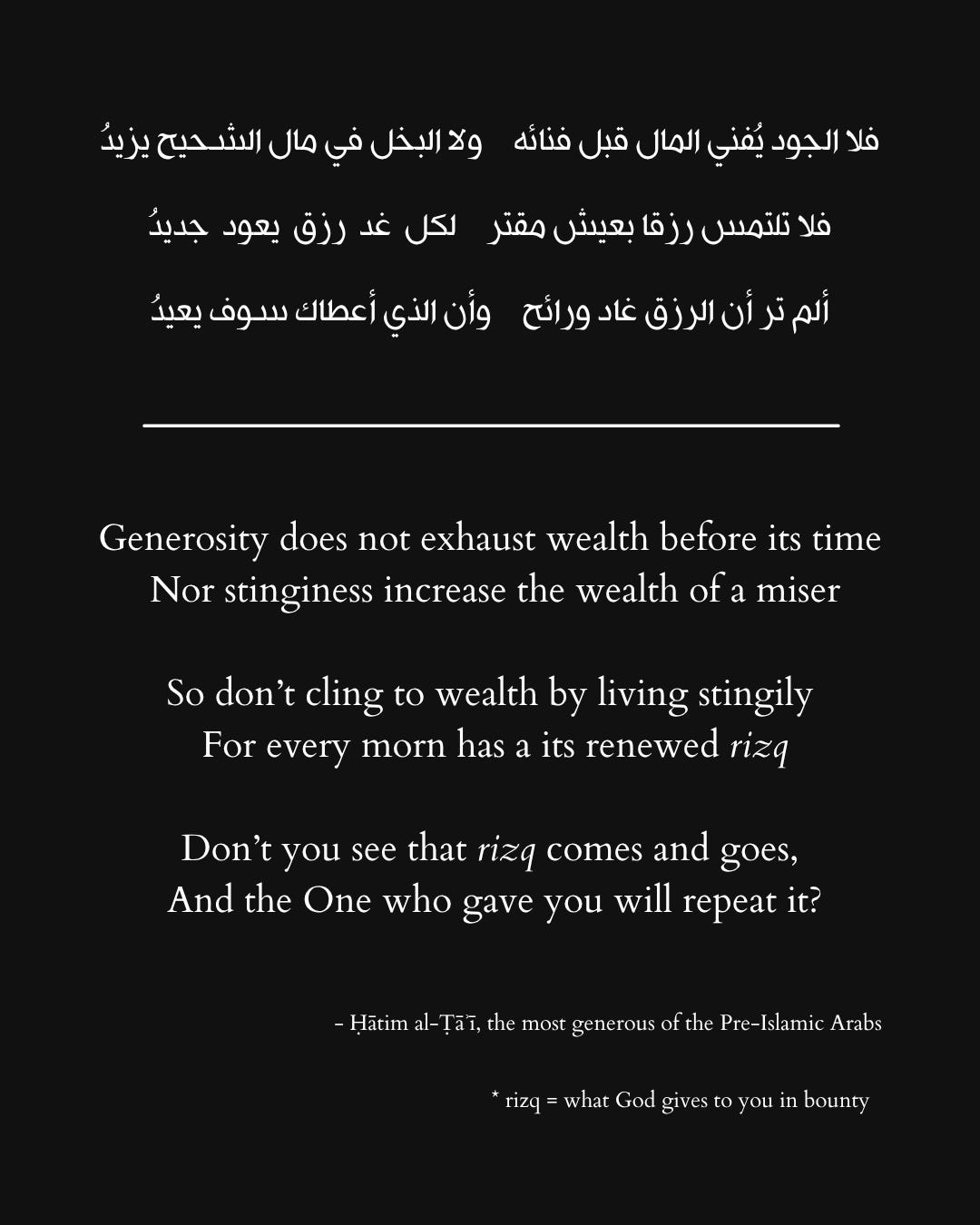What Is the Solution for a Selfish World?
The value at the heart of socio-political transformation
Generosity is the most counter-cultural value in today’s world. Muslim thought is a theology of rizq – that a man is given what he is given by the One who gives, not collected by outstripping others in competitive back-stabbing, ladder-climbing, and excessive monetizing. Man’s sincere effort and endeavor is nothing but an invocation to God for rizq; and God, from His own generosity and favor upon man, creates barakah (grace) in his affairs and answers his prayer.
One of the consequences of this theology is that there are two kinds of invocations: that which is said with the lips and that which is said with the body. Neither of them create outcomes – both of them are invocations for God’s mercy to bless sincere efforts and faith. Then, some invocations are answered immediately; some answers are delayed; and some answers are kept with Him to give on the last day.
This is the exact opposite of the way modern man thinks of his effort. He believes that he endeavors himself; that his endeavors lead to outcomes; that those outcomes create results. Man thinks himself a demigod at least, a co-creator of the universe, an originator of wealth and health and good and evil, a god amongst gods who brings about all that is and all that becomes with the creative action of his own might and will.
And it is for that reason that the first man is compelled to an ethic of generosity, and the second becomes miserly and stingy.
When one believes that all his actions are nothing but a prayer, and that all one ever receives is the manifestation of God’s hand in his life, he is not self-satisfied for having achieved greater success than others; he is humbled by the generosity of his most giving Lord. So, when he sees others raising their hands and voices to the heavens, or toiling with sweat and tears in their own actions, or desperate and destitute in a moment of helplessness – he is compelled to become a manifestation of God’s answer to their own prayers.
We have forgotten what it means to be generous because we are told that generosity is a weakness. We have been told generosity is a weakness because the lack of generosity creates a monetizable market. Because there are many forms of generosity – every kind of rizq has its own generosity – and each of those forms of generosity is a threat to a capitalist ethic.
Generosity of money and wealth is charity. Generosity of care and emotion is friendship. Generosity of time and effort is attention. Generosity of empathy and affection is compassion. Generosity of one’s entire being is love. If one doesn’t have excess wealth, one can give care; if one doesn’t have excess care, one can give time; if one doesn’t have excess time, one can give affection. Every bounty given by God can be given in generosity to others.
A society that is generous is one that builds each other using the excess of both the material and immaterial to care for one another. But that society built on mutual generosity is a threat to the entire capitalist world view.
The capitalist believes that man only acts in complete material self-interest. He is not driven by love and compassion and gratitude; he is only driven by greed and selfishness. If you can convince the world to stop being generous, you can convince them to stop caring for one another. And if you can convince them to stop caring for one another, you can create an epidemic of loneliness and isolation. And, in an epidemic of loneliness and isolation, you can create a market where you can package the feeling of care and compassion for a premium subscription and sell it back to society.
The capitalist mind is a colonial ethic: to destroy societies, extract resources, and then sell it back as packaged good. We are living in societies that have been colonized by its elites, and the elites have convinced us that the colonial enterprise is just good economics. In that reality, the most radical thing you can do is to be generous.
“And they ask you as to what they should spend. Say, “whatever is extra.” (Quran, Chapter 2, Verse 219)




Such a beautiful article. May Allah bless you abundantly
Masha Allah. Very thought provoking and actually hit more than one nerve. A much needed reminder. Thank your, brother Saad.